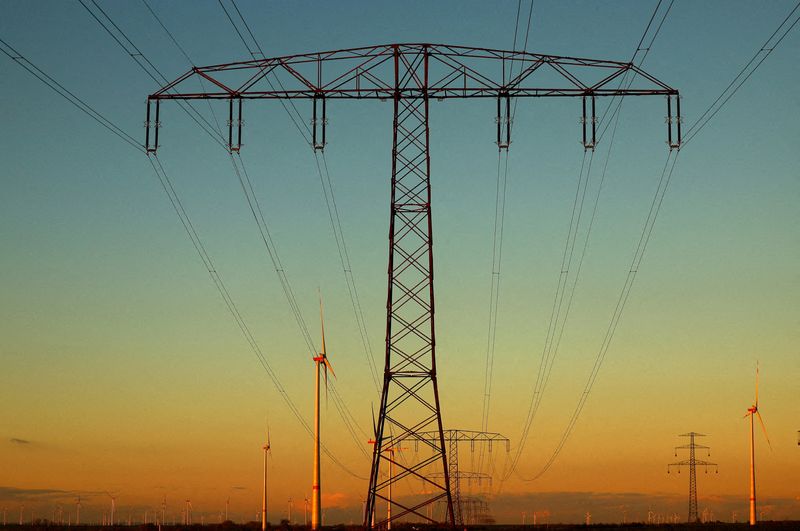

© Reuters. FILE PHOTO: Electrical power pylons with high-voltage power lines are seen next to wind turbines near Weselitz, Germany November 18, 2022. REUTERS/Lisi Niesner/File Photo
By Kate Abnett and Julia Payne
BRUSSELS (Reuters) – European Union countries are considering scrapping a central part of reforms to Europe’s electricity market, amid a deadlock between France and Germany over state aid for power plants, a document seen by Reuters showed.
The 27 EU countries are seeking a joint position on planned reforms to the EU’s power market, but countries including Germany and France have been at odds for months over whether the rules could give some countries a competitive edge over others.
At issue is whether governments will be able to offer state-backed, fixed-price power contracts to existing power plants – then collect excess revenues generated by these contracts and spend it on subsidising industries.
France is keen to apply these subsidies to its nuclear power fleet, and the proposed rules have backing from central and eastern countries. But Germany and others are firmly against – warning this could give French industries an advantage over their own.
A draft compromise, seen by Reuters, asked countries to consider three options – including completely removing the rules on these subsidies from the reform.
The other two options in the document prepared by Spain, which holds the EU’s rotating presidency, would limit how countries can use the revenues raised through the power price subsidies, and allow Brussels to step in and limit a country’s use of these revenues if it was distorting the EU’s single market.
It marks the first time countries have considered simply scrapping the rules, after struggling to find a compromise.
Failure to pass this part of the reform would not ban France and other countries from offering fixed-price power contracts to generators. But it could make them harder to use, and subject to winning approval from Brussels under EU state aid rules.
One senior EU diplomat said the two sides appeared “further apart than in June”, referring to a meeting where EU countries’ energy ministers failed to agree a compromise on the law.
The European Commission’s original reform proposal, made in March, was designed to move power generators to more long-term, fixed-price contracts, so that consumers would be less exposed to short-term gas price spikes like those seen last year.
To achieve this, Brussels proposed that public support for new investments in renewable and nuclear plants must take the form of fixed-price state-backed power contracts. It is this section that countries may delete.
EU countries’ ambassadors will discuss the proposal on Wednesday. They face an Oct. 17 deadline when energy ministers meet to try to strike a deal.






